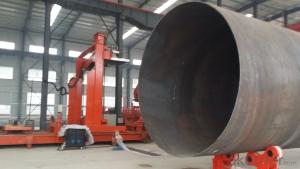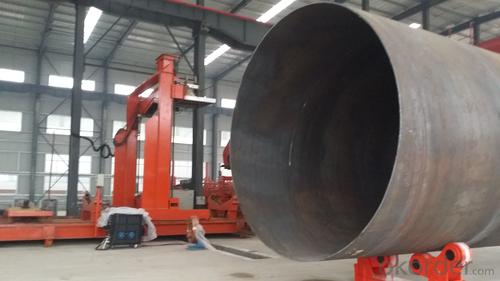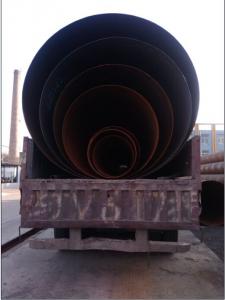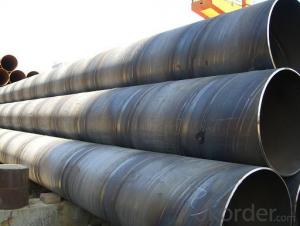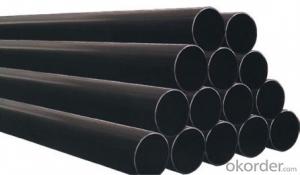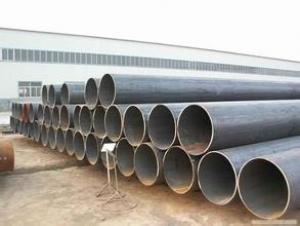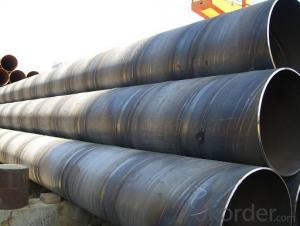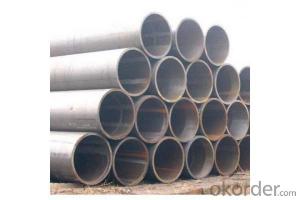60'' CARBON STEEL SSAW WELDED PIPE API/ASTM/JIS/DIN
- Loading Port:
- Tianjin
- Payment Terms:
- TT OR LC
- Min Order Qty:
- 5 m.t
- Supply Capability:
- 300 m.t/month
OKorder Service Pledge
OKorder Financial Service
You Might Also Like
Packaging & Delivery
Packaging Detail: | standard export packing or as customer's requirement |
Delivery Detail: | within 10 - 30 days |
Specifications
Spiral Welded Steel Pipes and Tubes
1.Material:Q195-Q235
2.Length:1-12m
3.WT:1.0-14mm
4.O.D.:20-273mm
Product Description:
1.Material : Q235,Q345,L245,L290,L360,L415,L450,L485,GrB,X42,46,X52,X56,X60,X65,X70,X80,X100
2,Standard: SY/T5037-2000,GB/T9711-2011,API Spec 5L PSL1/PSL2,ASTM A252\A53,ISO3183,DIN17172,EN10217,JIS G3457,AWWA C200,ASTM A139,ASTM A671,ASTM A672
3.Wall thickness: 3.0mm-30mm
4.Outer diameter: φ168mm-3020mm
5,Length: 5m-12m or as your requirement
6,Corrosion protection standard: DIN30670,DIN30671, AWWAC210, AWWA C203, SY/T0413-2002,SY/T0414-2002
7,Application: Oil, gas, natural gas, water pipe, thermal electricity pipe, steel structure engineering, etc
Q195-q345 Material Steel Pipe's Materials
Elements | Chemical Compsition% | Mechanical Property | ||||||
C% | Mn% | S% | P% | Si% | Yield Point (Mpa) | Tensile Strength(Mpa) | Elongation | |
Q195 | 0.06-0.12 | 0.25-0.50 | <0.050< span=""> | <0.045< span=""> | <0.030< span=""> | >195 | 315-430 | 32-33 |
Q215 | 0.09-0.15 | 0.25-0.55 | <0.05< span=""> | <0.045< span=""> | <0.030< span=""> | >215 | 335-450 | 26-31 |
Q235 | 0.12-0.20 | 0.30-0.70 | <0.045< span=""> | <0.045< span=""> | <0.030< span=""> | >235 | 375-500 | 24-26 |
Q345 | <0.20< span=""> | 1.0-1.6 | <0.040< span=""> | <0.040< span=""> | <0.55< span=""> | >345 | 470-630 | 21-22 |
Packaging & Delivery
Packaging Detail: | Normal exporting packing,in container or bulk vessel or as per clients' request |
Delivery Detail: | 2 months after confimed contract |
Specifications
Large Diameter API 5L X70 PSL2 LSAW Steel Pipe
Grade: X42, X46, X50, X52, X60, B, C
OD: 1.5"-28"
WT: SCH10-SCH160
Brand:TPCO
Large Diameter API 5L X70 PSL2 LSAW Steel Pipe
Specifications:
u Standard: API 5L
u Grade: B, C, X42, X46, X50, X52, X56, X60, X65, X70, X80
u OD: 1.5"-28"
u WT: SCH10-SCH160
u Length: 5-12m
u Ends Finish: plain end, bevel end, grooved end
u Surface Treatment: bare, black varnished, oiled finish, red color, anti-corrosion, 3PE, FBE or epoxy coating
u Technique: hot rolled or cold drawn
u Application: api 5l steel pipe for conveying oil, water, gas
u Invoicing: based on theoretical weight or actual weight
u Payment Terms: L/C at sight, T/T or Western Union
u Trade Terms: FOB, CFR, CIF
u Certification: ABS manufacturing assessment, ABS design assessment, API 5CT, API 5L, DNV manufacturer certificate, ISO9001 quality management system certificate, ISO14001 environment management system certificate, GB/T28001 occupational health and safety management system certificate, A1 class manufacturing license of special equipment certificate, CCS, GL, LR, SGS, TüV, PDE
- Q: What is the standard length of a steel pipe?
- The industry and application dictate the standard length of a steel pipe, which can vary. In general, steel pipes typically range from 18 to 24 feet in length. These lengths find common usage in construction, plumbing, and various industrial applications. It is worth mentioning that custom lengths are also available to accommodate specific project needs.
- Q: How are steel pipes used in the manufacturing of HVAC systems?
- Steel pipes are commonly used in the manufacturing of HVAC systems for various purposes. They are used to transport fluids, such as water or refrigerants, throughout the system. Steel pipes are also used for exhaust systems and ventilation, providing a durable and corrosion-resistant solution. Additionally, steel pipes are used in the construction of HVAC equipment, such as heat exchangers and boilers, due to their strength and ability to withstand high temperatures and pressures. Overall, steel pipes play a crucial role in the efficient and reliable functioning of HVAC systems.
- Q: What are the different types of steel pipe caps?
- There exists a variety of steel pipe caps, each serving specific purposes and applications. A few commonly used types are as follows: 1. Threaded Caps: These caps possess internal threads that enable them to be screwed onto threaded pipes, ensuring a secure seal. They find frequent usage in plumbing and gas-related tasks. 2. Socket Weld Caps: These caps are designed for welding onto pipe ends using a socket weld connection. They offer a strong and permanent seal, rendering them suitable for high-pressure and high-temperature tasks. 3. Butt Weld Caps: Butt weld caps, similar to socket weld caps, are meant for welding onto pipe ends. However, they are specifically designed for butt welding, which involves directly welding the cap to the pipe without additional fittings. 4. Domed Caps: These caps have a domed or rounded shape on the upper surface, providing a smooth and visually pleasing finish. They are commonly applied in architectural and decorative tasks, such as handrails or fence posts. 5. Flat Caps: As the name suggests, flat caps possess a flat upper surface. They are often utilized when a simple and low-profile cap is required, such as for safeguarding pipe ends in industrial applications. 6. Blind Caps: Blind caps are employed to permanently seal off pipe ends. They are solid caps without any openings or threads, ensuring complete closure. They are frequently utilized in piping systems where a section of the pipeline is not in use or temporarily needs to be closed off. These examples merely scratch the surface of the various steel pipe caps available. The selection of a cap depends on specific application requirements, including the type of connection, pressure, temperature, and the necessity for structural or decorative finishes. It is crucial to choose the appropriate cap to guarantee a secure and reliable seal for the pipe.
- Q: What are the different types of joints used with steel pipes?
- There are several types of joints used with steel pipes, including threaded joints, welded joints, flanged joints, and grooved joints.
- Q: What is the difference between steel pipe and tubing?
- The main difference between steel pipe and tubing lies in their shape and size. Steel pipe is typically cylindrical in shape and has a larger diameter compared to tubing, which is generally produced in a variety of shapes, including round, square, and rectangular, with smaller diameters. Additionally, steel pipe is commonly used for transporting fluids and gases, while tubing is often utilized for structural applications or as components in mechanical systems.
- Q: How are steel pipes used in the transportation of fluids?
- Steel pipes are commonly used in the transportation of fluids due to their high strength and durability. They are used in various industries, including oil and gas, water supply, and sewage systems. Steel pipes are ideal for fluid transportation as they can handle high pressure and are resistant to corrosion. They are used to transport liquids and gases over long distances, ensuring a safe and efficient flow of fluids.
- Q: How do steel pipes handle high-velocity flow?
- Steel pipes are highly capable of handling high-velocity flow due to their inherent strength and durability. The robustness of steel allows it to withstand the pressure exerted by the high-velocity flow, minimizing the risk of deformation or failure. Additionally, steel pipes have smooth interiors, which reduces frictional losses and ensures efficient flow rates even at high velocities.
- Q: What are the different types of steel pipe fittings for chemical processing plants?
- There are several types of steel pipe fittings commonly used in chemical processing plants, including elbows, tees, reducers, flanges, and valves. Elbows are used to change the direction of the flow, tees are used to combine or split the flow, reducers are used to connect pipes with different diameters, flanges are used for connecting pipes and valves, and valves control the flow of fluid within the system.
- Q: How are steel pipes protected against electromagnetic interference?
- Steel pipes can be protected against electromagnetic interference by using a variety of methods such as shielding, grounding, and insulation. Shielding involves wrapping the pipes with a conductive material, like copper or aluminum, which acts as a barrier to block electromagnetic waves. Grounding ensures that any stray electrical charges are safely directed away from the pipes, reducing the risk of interference. Insulation, such as coatings or sleeves, can also be applied to prevent direct contact between the pipes and potential sources of electromagnetic interference.
- Q: What are the different types of steel pipes?
- There are several different types of steel pipes, including seamless steel pipes, welded steel pipes, galvanized steel pipes, and stainless steel pipes.
Send your message to us
60'' CARBON STEEL SSAW WELDED PIPE API/ASTM/JIS/DIN
- Loading Port:
- Tianjin
- Payment Terms:
- TT OR LC
- Min Order Qty:
- 5 m.t
- Supply Capability:
- 300 m.t/month
OKorder Service Pledge
OKorder Financial Service
Similar products
Hot products
Hot Searches
Related keywords
